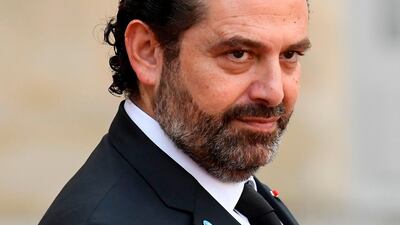Reports that Prime Minister Saad Hariri sent more than US$16 million to a South African bikini model has been met with caution and suspicion in Lebanon, where the media shies away from the private lives of politicians.
Mr Hariri, 49, a married father of three who inherited part of his late father's business empire, started sending money to Candice van der Merwe, 26, in 2013 after meeting her at an exclusive resort in the Seychelles, The New York Times reported on Monday.
Unusually large bank transfers aroused suspicions among South Africa's finance and tax authorities, the paper quoted judicial documents in the country as saying.
Believing the money was meant for the model's father, a businessman who fought repeated court battles with the tax authorities, they froze it.
Mr Hariri’s connection to the case was made public in South Africa in December 2018, when Ms van der Merwe, who claimed that the money was a gift, decided to sue government officials for US$65m in damages for pursuing her.
But South African media reported that her lawyer would not confirm nor deny that Mr Hariri was identified as her “companion”.
Mr Hariri's office did not respond to The National's request for comment, and the transfers do not seem to have breached the law.
But the allegations come at a highly sensitive time for Lebanon and Mr Hariri, fuelling conspiracy theories.
Violent protests erupted this week after a shortage of US dollars, which is used interchangeably in Lebanon along with the local currency, driving fears that the country is facing an imminent financial crisis.
On September 18, Mr Hariri announced that Future TV, the television network founded in 1993 by his father, former prime minister Rafiq Hariri, would be suspended for financial reasons.
Many of its 380 employees had not been paid for years and it remains unclear when they will recover their salaries.
The employees went on strike in August, complaining that Mr Hariri, a billionaire, was not bailing them out.
In Lebanon, the line between public and private money is often blurred. Many Lebanese political parties and their leaders fund media companies to act as their mouth pieces.
In the summer of 2017, Mr Hariri’s Saudi Arabian construction company, Saudi Oger, collapsed, leaving thousands unemployed and in some cases stranded there with no funds to return to their home country.
Despite The New York Times story's potential damage to his reputation, Lebanese politicians have remained silent.
Mr Hariri seemed to hint at the article in a speech on Tuesday.
“Whatever campaign they launch against me and whatever they say or write, I will continue to work and will not stop,” he said.
TV networks have steered clear of the story, focusing on the country’s economic problems or on Mr Hariri’s attendance at the funeral of former president of France Jacques Chirac, during which he became emotional.
Newspaper coverage was minimal. Al Akhbar, a daily newspaper that supports Mr Hariri's main political opponent, Hezbollah, tried to defend the prime minister, accusing Times of working at the behest of the US government to increase pressure on him to resign.
It questioned the article’s "highly sensitive" timing, arguing that it was "linked to American pressures on Lebanon and sanctions and the necessity of keeping Hariri far away from Hezbollah".
The US recently increased sanctions on Iran-backed Hezbollah and has threatened to target its non-Shiite allies.
On social media, many derided the prime minister for his alleged affair, but former employees of Future TV also attacked The New York Times and the US administration.
“You have clearly received a green light from whatever intelligence agency you work for,” tweeted Amer Tabsh, a former presenter at Future TV.
"There are many hints in the article that show what you have written and its timing are not innocent."
Hezbollah backers also voiced their support on Twitter, saying: “The financial payments were made with private money for a private matter at a time when Mr Hariri helped many [in Lebanon]”.
The author of the article, Ben Hubbard, responded on Twitter.
“Some are speculating about why this article was published now," he posted.
"It's simple. We received the documents recently and found them to be newsworthy, so we published an article.
"If I had had the documents last year, or some other year, I would have done the story then. That's it.”
Ayman Mhanna, director of the Lebanese media watchdog SKeyes, said that the conspiracy theories had to be placed in the context of panic about the Lebanese economy.
“People are already panicking and now, in addition to all their problems, there is this article that represents an additional problem," Mr Mhanna said.
" That’s why they believe it is politically timed.".
But he said the conspiracy theories made little sense, because by weakening Mr Hariri, the US would only strengthen Hezbollah, which it considers a terrorist organisation
Roland Barbar, a former producer at Future TV, said that the story was unlikely to cause political harm to Mr Hariri because Lebanese journalists avoided attacking politicians about their private lives.
“In Lebanon, there is respect for the private and sexual life of public figures," Mr Barbar said.
"Additionally, no one dares to tackle the subject of extramarital relations with politicians simply because everyone has so much to lose, including local journalists and almost all politicians.
“Everyone has their own little dirty secret to protect. It’s a Pandora’s box."

